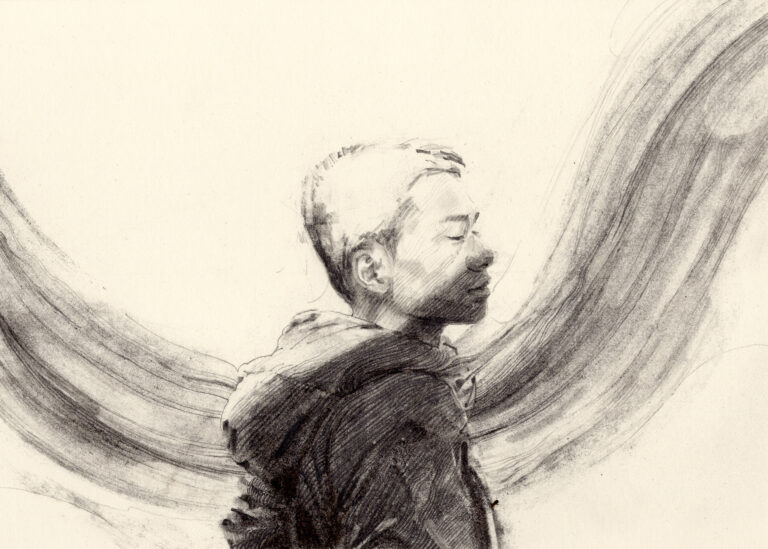Living the Questions
At home, frustrated, and stressed — is ‘just being’ worthy right now?
As Anna Bondoc from Los Angeles wrote to us: So many of us are raised to believe that hard work is what makes us valuable; many of our professions and even our identities as helpers are on hold. How does self-worth interact with just being when we feel we’re doing nothing? Krista reflects on the problem with the phrase “just being” — and how settling inside ourselves right now, and kindness towards ourselves, are gifts to the world we want to make beyond this crisis.
Living the Questions is an occasional On Being segment where Krista muses on questions from our listening community. Submit your own at [email protected].
Guest

Krista Tippett created and leads The On Being Project and hosts the On Being radio show and podcast. She’s a National Humanities Medalist, and The New York Times bestselling author of Becoming Wise: An Inquiry into the Mystery and Art of Living. Read her full bio here.
Transcript
Anna Bondoc: Hi, Krista. This is Anna Bondoc calling from Los Angeles, California. I’ve been sitting at home with my family doing not much of anything for the last six days, now, on self-quarantine. And it’s got me thinking about something that has plagued me, really, most of my life. I’m the daughter of first-generation immigrants from the Philippines, and they raised me to believe that only through hard work and application of myself and my opportunities that I would be worth something and have a place in society. So I’ve been sitting here, frustrated and stressed — I’m not a healthcare worker, I can’t be my normal, teacher self, interact with kids and help that way — and so my identity as a helper has been put on hold. And I’ve been thinking a lot about what it means to just be and how that intersects with the notion, which I think is quite American, to be worth something. How does self-worth interact with just being? So my question is, if I believe that we are all inherently worthy just by being human, how can I feel that way when I feel I’m doing “nothing”?
Krista Tippett: Oh, those are such good questions. I just completely agree that this is an American thing. I also think it’s a modernity thing. And it’s a lie we’ve been told. But I also think that part of what is wrong about it is not just the idea that it’s only through hard work or through work or action that we become worthy and valuable, but that just being. It’s that “just” in front of “being” — the idea that being is something passive, and empty. Because being is also about our presence — our presence in the world, our presence to others, our presence towards our families. Which is, moment-to-moment, really powerful.
And I do think that one of the unexpected — maybe it shouldn’t have been unexpected, if we’d all listened to Rebecca Solnit three years ago – but one of the unexpected experiences of this crisis has been the value of our presence in each other’s lives, the value of care and caregiving. And yes, that is about healthcare workers, but it’s also about parents, and it’s about neighbors, and it’s about — I see people in every profession imagining how they can be of service with their presence; with what they already know; with where they already are.
And another lesson that’s so much on my mind, just in my experience of quarantine and my experience of being alive right now, is how important it becomes to care for ourselves — that aspect of being. And that is even more countercultural; that has even more been driven out of us. I don’t come from an immigrant family, but my family also had circumstances that conspired to make me feel that my value was absolutely dependent on my contribution, my performance, my action. This crisis of the moment is — or certainly can be — the beginning of different ways of living, of different ways of structuring things.
We were just speaking here, together in the office, about how these really ordinary pieces of discipline and living. Like how much we have in our refrigerator, and how we’re starting to work from what we have, rather than always identifying what we might go out and buy. These are old habits, but they’re new habits for a lot of us, for 21st-century people. On so many levels, in both ordinary experiences and also big — the way this crisis is exposing all the fractures, all the empty and inadequate spaces in the web of our society — there’s work ahead, there’s struggle ahead, there’s suffering ahead, and there’s also, potentially, incredible growth ahead.
So that’s a really long-winded way of saying that I think right now part of this work of being, as you say, is also about tending to ourselves. Tending to, being kind to, ourselves as much as we can. And this is not going to always be possible for people who are actually having to work very hard in this moment, or people who are home with small children, or just the incredible distraction of feeling what’s happening in the world outside, which I’m so aware of. But if and when it feels possible, use this moment of all the structure – all the possibility of being active and showing your worth by doing – where that has fallen away. It is a great gift to yourself, and, also to the world — not just the immediate world around you right now, but the world that we want to make, moving out of this — to get settled inside yourself; to know what it means to befriend reality; to figure out how to stay soft. That’s one of the hardest things right now; it’s hard for me. But all of that is going to be a piece of resilience for the long work ahead that this crisis has really made apparent.
It’s been a mantra for me, in these days and in these weeks, this one line from a poem or a blessing from John O’Donohue, who’s been such a beloved voice in the On Being world: “Be exceedingly kind to yourself.” It might surprise people who just know my on-air personality, but that is not a place I go, naturally. I think that’s not a place a lot of us were taught to go.
So practicing that, that hard work of being exceedingly kind to ourselves — which is a very reality-based thing right now, because it’s hard to move through the days now — that is being, and that is honoring the complexity of being. It is going to shape your presence to yourself, your presence to others, that always has more ripple effects than you can know. And it’s going to be a piece of us cultivating depth and calm and resilience and even, I think, creativity for this long work ahead.
So those are some of the things I’m thinking about, to that beautiful question.
